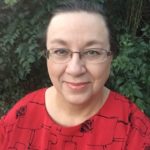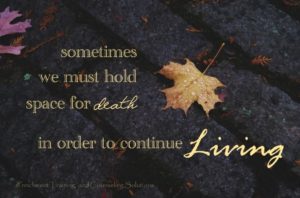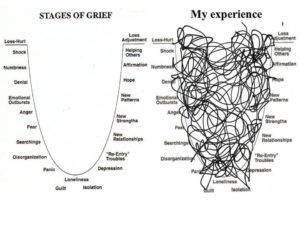By Jamie Graham
Twenty-two years ago, I found myself lying on a massage table with fine thin needles being inserted into various parts of my body. The problem that had brought me to this unusual position was a monthly fluctuation in moods called Premenstrual Syndrome, accompanied by severe debilitating cramps. During my monthly cycle, I would swing between tears and irritability. Acupuncture had been recommended to me by a friend whose sister was attending the Academy of Oriental Medicine at Austin (AOMA). My friend assured me her sister, or one of her fellow interns in the student clinic at AOMA, would be able to help both with the pain and the moods.
 Being in such misery, I was willing to try anything. During my treatment, which included two interns and an instructor asking questions, taking my pulse and looking at my tongue, I mentioned I often had a feeling of something being stuck in my throat that wouldn’t go down when I swallowed. A look of understanding passed between the two interns and one of them explained this was something Chinese medicine called Plum Pi Qi and it clearly was indicated in my diagnosis of Liver Qi stagnation. After the needles were removed, they also gave me an herbal formula and recommended I return for future treatments.
Being in such misery, I was willing to try anything. During my treatment, which included two interns and an instructor asking questions, taking my pulse and looking at my tongue, I mentioned I often had a feeling of something being stuck in my throat that wouldn’t go down when I swallowed. A look of understanding passed between the two interns and one of them explained this was something Chinese medicine called Plum Pi Qi and it clearly was indicated in my diagnosis of Liver Qi stagnation. After the needles were removed, they also gave me an herbal formula and recommended I return for future treatments.
I was amazed at the results. I felt calmer, more centered and as a bonus, during the next monthly cycle, my cramps were much reduced. I was hooked.
Six years later, I was the intern seeing clients in the student clinic at AOMA. Many of those clients had mental health issues, ranging from depression, anxiety, grief, anger, PTSD and many others.
At AOMA, we learned emotional issues were related to stagnation of an energy called Qi (pronounced chee). Each emotion was also related to a specific organ system. Grief was related to lungs, anger and depression to liver, fear to kidneys, worry to spleen, overjoy (mania) to heart. By releasing this stagnation with the acupuncture needles and rebalancing the specific organ system, these mental health issues could eventually be resolved.
After graduation, I began to research how acupuncture helps resolve these issues. Western medicine had begun doing research studies on acupuncture. While many of these focused on pain, several of them also focused on mental health issues. There are many theories as to why acupuncture helps pain and other issues such as depression, anxiety and PTSD, one of the things we do know is acupuncture affects brain chemistry. It causes the body to release endorphins, serotonin, and enkephalins and other brain chemicals that help our body with pain, emotions and our immune system. It also increases receptor sites for these chemicals to attach to within the body.
One of the most interesting continuing education classes I have taken was working with veterans suffering from PTSD through an organization called Vet TRIIP (Veterans Team Recovery Integrative Immersion Process). This organization uses a multi-disciplinary approach to working with veteran PTSD. They incorporate tai chi or qigong, acupuncture, massage therapy, chiropractic, talk therapy and other modalities to help the veterans in their recovery.
The first veteran I treated was one who was, “wound very tight.” He had chronic pain in his lower back and neck. Using just a few acupuncture needles and sitting with him quietly, I watch as the tension left his body. After the needles were removed, he stood up, and a smile came across his face as he realized his pain had eased. “I feel so relaxed,” he said, “and the pain is much less.”
Another veteran I worked with was also a survivor of sexual assault. She was having severe anxiety and insomnia. She also had chronic pain. She, too, was very tense—emotionally and physically. During the treatment, she was actually able to fall asleep, and afterwards told me she felt calmer, like she could finally take a deep breath.
Of course, veterans with PTSD aren’t the only ones to benefit from acupuncture’s effects on mental health issues.
Another training I took is called NADA (National Acupuncture Detoxification Association). This simple 5 needle acupuncture, done entirely in the outer ear, has been used to help people wean off drugs, alcohol and tobacco. One of its main effects is to help reduce stress and anxiety. It was used by acupuncturists to help first responders and victims deal with stress after 9/11, Hurricane Katrina and many other disasters. It’s also used by Acupuncturists Without Borders when they respond to disaster sites around the world.
I use NADA quite often in conjunction with body acupuncture for my clients experiencing stress, depression or anxiety. One of the main points in this treatment is Shen Men, which translates as Spirit Gate. Quite often, if someone is in a stressful situation, I will add a very tiny (.06 mm) needle on a piece of tape to Shen Men, to help them deal with stress after they leave the clinic.
During my 16 years of treating clients with acupuncture, I’m still amazed when someone sits up from the treatment table with a relaxed smile on their face as they tell me how calm and energized they feel. And often, that’s just a side benefit from other issues we’ve been addressing. It’s one of the reasons I love my work.
 Jamie Graham is the owner of Healing Touch Acupuncture and is a licensed acupuncturist practicing in Waco. She has a Master of Science in Oriental Medicine from the Academy of Oriental Medicine at Austin. She and her husband, Bob, will be celebrating 43 years of marriage in March. She has one daughter and one grandson who are the joy of her life. She is owned by a Russian blue cat named Walter and a very spoiled shih tzu named Brandi. When she’s not using needles as an acupuncturist, she uses different kinds of needles in her textile art, quilting, knitting and embroidery work.
Jamie Graham is the owner of Healing Touch Acupuncture and is a licensed acupuncturist practicing in Waco. She has a Master of Science in Oriental Medicine from the Academy of Oriental Medicine at Austin. She and her husband, Bob, will be celebrating 43 years of marriage in March. She has one daughter and one grandson who are the joy of her life. She is owned by a Russian blue cat named Walter and a very spoiled shih tzu named Brandi. When she’s not using needles as an acupuncturist, she uses different kinds of needles in her textile art, quilting, knitting and embroidery work.
You may contact Jamie at Healing Touch Acupuncture: 254-759-8050 | [email protected] | www.healingtouchacupuncture.com | www.Facebook.com/HealingTouchAcupuncture
The Act Locally Waco blog publishes posts with a connection to these aspirations for Waco. If you are interested in writing for the Act Locally Waco Blog, please email [email protected] for more information.
By Jennifer Alumbaugh, LMFT
I’ve had a few, what I like to call “Job years” in my life, those seasons when the hits just keep on coming and I’ve barely recovered my breath from one loss while I’m learning of the next one.
I had my first Job year when I was 8/9: my parents got divorced, my favorite kindred Aunt passed away, my childhood best friends and neighbors moved away, I moved to a new city and school, and my mother got remarried. That year—actually, that all occurred within a nine month span—left a lot of gaping holes in my 9 year old soul, and aged me a few decades as well.
I went to a support group for kids who experienced loss of a parent via death or divorce and met a friend with whom I became close and stayed friends over the years through high school and a while beyond. She had lost her father to cancer. We talked about loss and grief and connected over understanding the kinds of things at our age many other kids didn’t.
“Be with those who also are grieving. As you tell your stories, you will share an understanding of the heart that is deeper than words.” –Karen Katafiasz
After college I moved to Texas to be a foster mother at a youth ranch. For the first few months I lived in a staff house and was on a 4-day rotation in a house for middle-school age girls. Six months after I moved my life to Texas, I and a few other staff members lost everything in a fire that consumed our living quarters. It was a different kind of loss—of things, material possessions—no people were hurt or killed in the night time blaze. But it left a scar that I still feel today, when I forget and look for that one shawl my grandmother gave me, or those photos from college, or the first quilt I ever sewed. The Red Cross voucher couldn’t replace those things.
Six months after the fire, I was parenting in another home. This time on my own in a house of eight high school aged girls. The girls had just given me my first Mother’s day that Sunday, complete with wildflowers picked on the walk home from church and grilled cheese lunch they insisted on making me and hand written cards. May 15, 2002. Wednesday. Two of my girls and one of the boys from the other house borrowed a friend’s car, skipped afternoon classes, and drove into town. I was told they were going so fast they died on impact, in an instant. That weekend I buried three children in three days.
Last year, I lost several family relationships including contact with my young nieces and nephew who I came to Waco to help raise during my brother-in-law’s deployment. These bonds were severed due to the effects of my brother-in-law’s Narcissistic abuse and other toxic power and control dynamics among family members.
My life has been marked by some profound circumstances of loss and grief. While there have also been extraordinary joys and life scattered throughout, I began learning early on that there is no returning to the way things were, there is only moving forward, with the pain, to create a new normal.
“There will come a time to remind yourself of your reasons for living. You have a future worth enduring for, and you deserve to find a renewed sense of purpose and pleasure in your life.” –Karen Katafiasz
What that looks like is different for everyone. Around the world various cultures and beliefs have a vibrant array of ritual, ceremony, and celebrations to remember the dead, to honor those who have crossed over before the rest of us. For some, solace is found in spiritual practices and the comfort of faith beliefs and communities. For others, peace is sought in living out legacies of those passed on. Some grieve loudly, with wailing and heaving sobs unbridled. Others sit Shiva, quietly contemplating, in their homes. Some wear the clothes of mourning, muted solemn hues; others don vibrant colors celebrating lives lived, joys relished, with light and music and laughter.
 Some losses are private, secret, taboos whispered about in hushed tones and behind closed doors. Some losses are splattered across front-page news, a community outrage, a public nightmare unending. Some losses are respected, others are judged, some are shamed, others are “good-riddanced.” But every loss is someone’s. And I believe we must hold space for death—of a person, a relationship, a dream, a hope, a moment, a creature, an identity—in order to continue living.
Some losses are private, secret, taboos whispered about in hushed tones and behind closed doors. Some losses are splattered across front-page news, a community outrage, a public nightmare unending. Some losses are respected, others are judged, some are shamed, others are “good-riddanced.” But every loss is someone’s. And I believe we must hold space for death—of a person, a relationship, a dream, a hope, a moment, a creature, an identity—in order to continue living.
If you’re like me and you’ve survived a loss or three or many, you’ve also endured the onslaught of usually well-intentioned but so often hurtful sayings and prescriptions shared by those on the outside of our suffering. In retrospect I can appreciate their good intentions, but in the moment, those words strike as swift and deep as arrows and their aching effects can linger for a long while after.
The truth is, there is no right or appropriate way to move through our experiences. The process, as much as our experience, is unique to each of us. What resonates with one, rubs another uncomfortably. What nourishes one, may set back another. There is no timeline, no expiration date, no ordered and linear path out and past grief. We grow familiar with it. Accustomed to the weight and shape of it in our lives. And around this reality, we begin piecing together a new us, a new life, a new rhythm.
 Elizabeth Kübler Ross gave us some language for discussing loss with her classic Five Stages of Grief (denial, anger, bargaining, depression, acceptance), yet many of us—professionally and personally—have come to realize that 1) there are many more than five parts and 2) they seem more like facets or stations at which one may visit multiple times along their journey through loss and grief. Personally, I find myself looking much more like the depiction on the right than any kind of neat, discernable, or graceful movement. (Picture source).
Elizabeth Kübler Ross gave us some language for discussing loss with her classic Five Stages of Grief (denial, anger, bargaining, depression, acceptance), yet many of us—professionally and personally—have come to realize that 1) there are many more than five parts and 2) they seem more like facets or stations at which one may visit multiple times along their journey through loss and grief. Personally, I find myself looking much more like the depiction on the right than any kind of neat, discernable, or graceful movement. (Picture source).
While there is no one formula for expressing grief, there are both healthy and unhelpful ways of coping with our feelings in the wake of loss. As a therapist, life coach, friend, and fellow mourner, I have sat with people of all ages, beliefs, cultures, and backgrounds through some of the darkest moments in life. I’ve sat with myself through them. In my experience, the most harm we can do is to ignore the feelings and to avoid talking about it. I know. It is scary and difficult and painful. Sometimes our losses shake and shatter everything we have come to believe, and in our grieving, we must rebuild what was razed to the ground.
I also know the beauty that can come from sharing the process with others—in therapy, in coaching sessions, in support groups, in creative outlets—we may find that in those moments when we feel we have been left with nothing, our words offer a light and a hope to another. And out of nothing, we find, a resilient something. There can be profound healing in a validating, “me too” of another sitting with us on our mourning bench. If you are finding yourself in this place, whether it is with a pastor, rabbi, elder, priest, counselor, life coach, friend, support group, mentor, therapist, or other trusted ally, I encourage you to seek the companionship of others along your journey through grief, loss, and finding a new normal. It is one path you don’t have to walk alone.
Resources:
- Holding Space – an ongoing, weekly grief and loss support group @ Enrichment Training & Counseling Solutions. Saturdays (March 5th) 10a-11:30am. Includes learning, creative projects, and guided discussion. Facilitated by Jennifer Alumbaugh, MS. Register here.
- GriefShare 12–week groups
- Providence Healthcare Network Support Groups
 Jennifer Alumbaugh, MS is a Licensed Marriage and Family Therapist providing clinical and professional development consultation services at Enrichment Training and Counseling Solutions. She has extensive experience working with adolescent and adult survivors of psychological and spiritual abuse, trauma (sexual violence, childhood trauma, interpersonal violence); and complex PTSD. These, along with grief and loss work are her areas of specialization. Jennifer practiced as a mental health clinician throughout Los Angeles County working with children, youth, and their families from 2007-2012. In Central Texas, Jennifer has worked as a Site Coordinator with Communities in Schools of The Heart of Texas at G.W. Carver Middle School; as an independent consultant and professional development trainer; and conference speaker. In 2016 Jennifer created an implemented a therapeutic creative writing program, Brave Young Voices, at Klaras Center for Families and at the Texas Juvenile Justice Department correctional campus at Mart, TX. She may be reached at: [email protected] or 254-405-2496.
Jennifer Alumbaugh, MS is a Licensed Marriage and Family Therapist providing clinical and professional development consultation services at Enrichment Training and Counseling Solutions. She has extensive experience working with adolescent and adult survivors of psychological and spiritual abuse, trauma (sexual violence, childhood trauma, interpersonal violence); and complex PTSD. These, along with grief and loss work are her areas of specialization. Jennifer practiced as a mental health clinician throughout Los Angeles County working with children, youth, and their families from 2007-2012. In Central Texas, Jennifer has worked as a Site Coordinator with Communities in Schools of The Heart of Texas at G.W. Carver Middle School; as an independent consultant and professional development trainer; and conference speaker. In 2016 Jennifer created an implemented a therapeutic creative writing program, Brave Young Voices, at Klaras Center for Families and at the Texas Juvenile Justice Department correctional campus at Mart, TX. She may be reached at: [email protected] or 254-405-2496.
The Act Locally Waco blog publishes posts with a connection to these Aspirations for Waco. If you are interested in writing for the Act Locally Waco Blog, please email [email protected] for more information.
